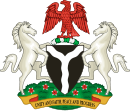| This article is part of a series in |
| Culture of Nigeria |
|---|
 |
Efik literature (Efik: Ñwed ikọ Efịk) is literature spoken or written in the Efik language, particularly by Efik people or speakers of the Efik language. Traditional Efik literature can be classified as follows; Ase (commemorative poetry), Uto (epic poetry), Mbụk (consisting of myths, legends and historical stories), Ñke (consisting of riddles, proverbs and tongue twisters) and Ikwọ (consisting of songs of various purposes such as religious purposes and mockery purposes).[1][2] Other aspects of Efik literature include prose and drama (Mbre).
Before the arrival of the missionaries in 1846, much of what consisted of Efik literature was oral literature.[3] By the late 1840s, Efik literature gradually transitioned into written form. The missionaries were instrumental in this transition. These Christian missionaries aided in the setting up of schools across Old Calabar.[4] At these schools, the Efik were shown how to write in the Efik language using the latin alphabets.[5] The earliest forms of Efik written literature were mainly of biblical genre and were developed by the early missionaries of the Church of Scotland mission.[6] By the 1920s, Efik literature gradually transitioned into other written and non-biblical genres such as prose, drama and poetry. The period between the 1920s and 1970s saw an immense amount of growth in Efik literature.
At present, Efik literature is an important aspect of Efik language learning in schools within the lower Cross River region and is an integral part of the Efik written exams within the West African Examinations Council (WAEC) orbit.[7] Students are recommended to study a range of Efik literary works to aid them in passing the exams. Among these literary works include Edikot Ñwed Mbuk series, Mutanda oyom Namondo, Ansa Udọ Enañ, Sidibe and several others.[8]
- ^ Cite error: The named reference
auto11was invoked but never defined (see the help page). - ^ Aye, Old Calabar, p.32
- ^ Aye, Old Calabar, p.188
- ^ Mcfarlan, p.28
- ^ Mcfarlan, p.34
- ^ Aye, The Efik language and its future, p.4
- ^ "List of Secondary School Subjects In Nigeria [By WAEC]". 16 February 2019. Retrieved October 29, 2021.
- ^ Cite error: The named reference
auto10was invoked but never defined (see the help page).